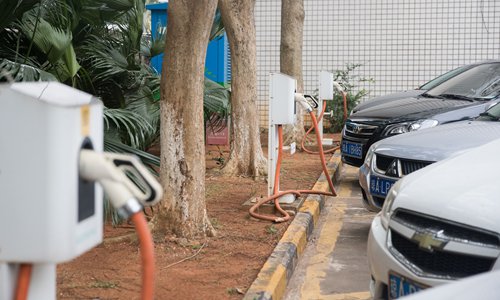HOME >> BUSINESS
Chinese rival takes aim at Tesla
By Li Xuanmin Source:Global Times Published: 2019/6/12 20:58:40
Evergrande gears up to make electric vehicles

Electric cars park near charging stations in Haikou, South China's Hainan Province. The tropical province issued a plan on Tuesday to boost the development of new-energy cars, vowing to ban the sales of fuel-based cars by 2030. It aims to upgrade its public service vehicle fleet with those powered by clean energy by 2020. Photo: VCG
Tesla, which is betting big on the Chinese market, faces a new but ambitious cash-rich rival from the real estate sector, Evergrande Group, which announced in recent days a 160 billion yuan ($23.12 billion) investment in Guangzhou, capital of South China's Guangdong Province, to build production bases for electric vehicles.
The move, coming from a property developer that is good at deciphering China's policy moves, could intensify pressure on the US automaker, whose plans in China already face strong uncertainty amid an escalation of the trade war. Some industry insiders say regulators could target Tesla after Ford, if China-US relations collapse.
Evergrande aims to invest 160 billion yuan in Guangzhou's Nansha district to set up three major bases for new energy vehicles, according to a statement the Nansha local government sent to the Global Times Wednesday.
One of the bases will have the capacity to manufacture 1 million vehicles annually. The other two bases will be able to produce as much as 500 GWh of batteries annually and electric motors and electronic control systems to equip the 1 million electric cars, the statement said.
Some industry observers said that Evergrande could pose a threat to Tesla several years down the line, as the Chinese developer has an incomparable advantage in capital and integrating technologies from the industrial chain, whereas Tesla is reported to face a cash flow problem and tight credit. Evergrande announced plans to enter the electric vehicle market last year. Already it claims to have acquired key technologies in the sector.
According to the statement, Evergrande has acquired a 51-percent stake in Sweden-based NEVS and set up joint ventures with Koenigsegg to develop vehicle research and building capacity. It also acquired Shanghai Cenat New Energy Co, a Sino-Japanese joint venture, to pursue world-leading power battery technology.
In contrast, it seems like Tesla's weak car-building ability and potential safety issues have drawn criticism from Chinese consumers. A Beijing-based resident surnamed Li, who took a test drive of a Tesla Model 3 recently, told the Global Times that she found "a number of poor designs" which prompted her to consider buying domestic brands. "The seats inside are very uncomfortable and the car body's seams are very large," Li noted.
Industry insiders also indicated that the Evergrande's decision to take on Tesla may be based on its understanding of Chinese policymakers' thinking. "Evergrande bought soccer clubs several years ago at a time when China was encouraging overseas deals. The company knows how the government thinks amid a trade war," an anonymous industry insider told the Global Times.
Feng Shiming, executive director of Menutor Consulting Shanghai, told the Global Times that Tesla does have an "overwhelming edge in intelligent technology based on large volumes of data it collected and automobile performance" compared with Evergrande and other Chinese electric vehicle start-ups like Xpeng.
But against the backdrop of a deepening China-US trade war, the US carmaker is also vulnerable to retaliation by the Chinese people.
In early June, Changan Ford, a joint venture between US automaker Ford Motor Co and China's Changan Automobile, was fined 163 million yuan by Chinese regulators for violating antitrust regulations.
Analysts suggested that if trade tensions continue to escalate, Chinese regulators could make Tesla, a representative of the US high-technology industry, a target. "The Shanghai government has offered a lot of help that facilitated Tesla's high-profile Gigafactory 3, including land and financing. So the Chinese government could do a lot around Tesla to hit back at the US," Feng said.
Tesla's factory in Shanghai is expected to be completed this summer and begin production in the second half of 2019, benzinga.com reported, citing a Tesla investor. But a source close to the matter said that mass production at the factory will only begin next year.
"Of course Chinese people will buy Tesla, but the demand will not be as high as some analysts have forecast considering the timing and the cars' problems," Feng said. "Tesla's cars will only be niche products in China."
Posted in: INDUSTRIES,COMPANIES